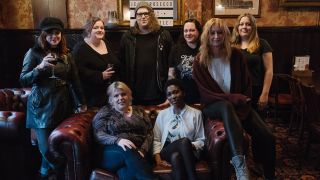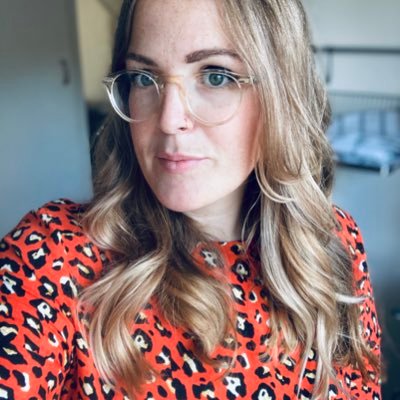As our month of She Rocks coverage draws to a close, we at TeamRock decided it was time to hear from the women directly impacted by the issues we’ve been covering. So, on a wintery afternoon in the back room of a London pub, we gathered nine key industry figures to discuss the issues facing the women involved in all areas of music – those behind the scenes, those on stages and those watching from the pit – and to work out where we all stand in 2018. From representation and inclusivity, to confidence, positive discrimination and the role of men in levelling the playing field, these are the things they had to say…
Panel members:
Emma Van Duyts, Director of Publicity at Public City PR
Em Foster, Nervus frontwoman
Becky Laverty, publicist at Pioneer Music Press
Harriet Hyde, Black Moth frontwoman
Lucy Hellings, Assistant Label Manager at Earache
Estella Adeyeri, Sound engineer and volunteer
Sarah Maynard, publicist at Major Press
Cassie Fox, Loud Women founder
Katie Smith, life-long rock music fan
Representation and inclusivity matter
One of the biggest points of discussion among our participants was that representation – seeing yourself in the people covered by magazines or on stage – makes a huge difference to how you navigate your place in music worlds. Stating explicitly that your scenes are open to all genders and backrounds can make a massive difference to those who might fear feeling out of place otherwise. While representation has improved in recent years, we still have a way to go.
Becky: “A lot of people discover their musical identity when they’re in their teenage years, and that’s when you’re looking for role models. It’s a self-fulfilling prophecy that when all you’re seeing is men on stage, that women automatically see that as a place that’s not for them. But that’s changing; there are many women on the front cover of magazines these days, like the She Rocks issues, and that’s a constant subliminal message that there is a space for women.”
Estella: “I think mainstream publications still have a lot to answer for, though, in that they’re not representing the way people taking the stage and audiences have changed. I feel like, especially with guitar magazines, I’ll still see Dave Grohl or someone on the cover and it’s like, it’s 2018, he’s still being idolised, and there’s all this nostalgia towards all these men. It doesn’t feel like there’s loads of people saying ‘Oh, actually, there’s all these great women, or great bands coming to the front’.”
Harriet: “I’ve been thinking a lot about L7 this week. They hold a really important position for me in the sense that when I was a teenager in the 00s, I learned about all the male grunge bands long before I heard about L7. The only way I discovered them was some random feature on ‘Most shocking! Most gross things ever in rock music!’ which was talking about when Donita Sparks threw her tampon across the crowd. And yeah, it was pretty rank, but good, y’know? Rock’n’roll should be rank and dirty and disgusting, and that’s one way women can be that. The thing for me was just the rage that came from, wow, how am I only just reading about these guys now, and in this context? They are a great band, and they were the first band that said to me as a woman that you don’t have to be with the band, you can be in the band.
“This kind of ‘groupie’ culture of, ‘Oh, wow, I like rock music, I like rock bands, how can I get closer to this? Maybe… by sucking the cock of a musician?’ What is that?! That started in the 60s and 70s, but so much has happened in feminism since then that it’s incredibly slow progress. L7 were around in the late 80s-early 90s, and they were this really powerful outlet of female testosterone, female aggression and rage and ‘fuck it’ attitude. That was what, 30 years ago? Why did they not inspire more of that?”
Becky: “Well, you are at the mercy of what is put in front of you.”
Harriet: “Exactly – I learned entirely from the music press about music. I had no cool older friends, no sisters.”
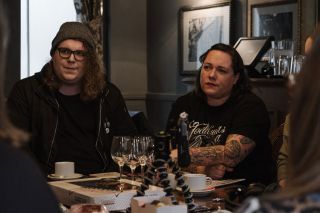
Becky: “Although what is happening with the She Rocks issues is a positive thing, I do still feel a little bit sad that [with all heavy music magazines] there’s not just 50% women throughout them. Because if a 15 year old girl went into WH Smith and she saw that, that’s your education changing, isn’t it?”
Harriet: “It would have changed everything for me. I honestly think there will be girls who pick up these She Rocks magazines and it will change everything.”
Lucy: “That’s why it’s quite exciting, because potentially in 20 years this conversation will be defunct. It won’t exist, because we will have the young girl growing up seeing all this and not having the same barriers we had. It just won’t exist, and there will be 50% women on festivals kicking arse.”
Estella: “One thing that’s really good about the She Rocks issues is that it really expels the myth of exceptionalism. When I was growing up reading Metal Hammer, there would literally be a woman in it every so often, and that woman would look a certain way – like Brody Dalle – so, you could be a woman in a band, but you should probably be white, really pretty and thin. I didn’t see anyone else in those pages. I think it’s really useful to have a cover where there’s actually loads of bands with women in, because don’t say you can’t find at least one band with women in, or you can’t fill a festival with women, because you’re just being ridiculous.”
Sarah: “I think there’s so much female talent in heavy music. There’s a platform, and there are a lot of outlets championing women in music in general, but they just never seem to get quite as much celebration. Festival bookers, for example, have to be thinking about it a little bit now – just not enough maybe. I did see someone take a festival poster and make it so it was an all women line-up, and it was a pretty legit line-up for that big festival. That proves there is female talent out there. Maybe with the biggest bands there’s that imbalance that’s inherent in our society, but there is talent that you could be putting on your bills and pushing more than you are right now.”
Em: “Representation should be something that’s at the front of your mind. I work in a record shop, and one of the customers told us, ‘I don’t know what the problem, is there’s loads of women on the walls of this record shop.’ I was like, ‘…that’s because we put the records on the walls.’ He replied ‘This is just what people want, isn’t it?’ I was like, ‘No, it becomes what people want because we put them on the walls, people see it on the walls and think it looks good.’ If there isn’t the right representation on the wall, if you aren’t representing people of colour, trans people, queer people, women, that becomes the thing that people don’t want. If that sits at the front of your mind, you can make sure that they are represented.
“It’s making steps to encourage people to [get involved in] these things. If something’s not necessarily pointing out that it’s inclusive or encouraging to [minority groups], you don’t know whether that’s going to be shit for you or not. It’s important to make it obvious that you are inclusive, because if you’re not obvious that you are inclusive, then you don’t appear inclusive.”
Cassie: “That’s why I do Loud Women festival every year. It’s not a huge thing, but it does get a lot of media attention, it gets radio play, CDs get made off the back of it. Venues then tell me they’ve been buying those CDs and trying to book all the bands that are on them. So a festival that’s only 1000 people in a room then ripples out and spreads that message. If you get more people who aren’t white, cis-het men on stages, then you get audiences that aren’t so many white, cis-het men.”
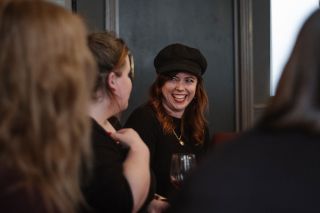
The image of heavy music being ‘by men, for men’ needs to go
It’s difficult to deny that from how it’s covered in the media to the way it’s marketed to fans, heavy music of all genres is still widely considered a male pursuit. Our group agreed that this is outdated and short-sighted, and that it’ll take an overhaul from the people in positions of power and the next generation to bring about significant change.
Becky: “Metal is an aggressive genre, and aggression is something that is most typically associated with men. I think the overtones, the personality traits you’d associate with the music is predominantly what’s traditionally known as ‘male’. I think that is changing, but not fast enough.”
Emma: “I think you just need to go to shows to see how much that’s changed in the last 15-20 years. I see tons of girls in the pit now, or sitting on the balcony, or getting involved at the front, singing their hearts out. When I worked with Linkin Park on Hybrid Theory, that changed a lot because they caught the eye of a lot of young girls who might have been into Britney at the time, but who went, ‘Oh, they’re kinda good looking, they’re a little bit rebellious…’ and then got really into the whole thing. It just depends on your path, doesn’t it? It’s that thing of what you get into as a kid. A lot of boys get into music, that’s their release. If they don’t like football or sport, they like music, whereas women are meant to have fashion and y’know, fucking, horses, and whatever.”
Lucy: “And that’s how we’ve all been raised. That’s quite interesting, isn’t it?”
Katie: “The issue starts so early. You literally learn gender norms in primary school.”
Harriet: “And the music magazines, in the newsagents, very often they’d be in the men’s section.”
Becky: “I think it’s important to remember that society was not accepting of women who were breaking the norm not that long ago. It was still only the generation before us where women were not really expected to have careers. So you could look at it as being a very slow progression, but also within our lifetimes things have changed very dramatically, that there can be women on the front cover of magazines for their talent. So it’s not an excuse, but while I think society is not moving as fast as I would like, it is moving.”
Emma: “But that’s a generational thing, look at all the kids now. I don’t mean to generalise, but the kids getting into music now aren’t going to face the barriers we had, because they have their peers around them and they’re all into bands and music.”
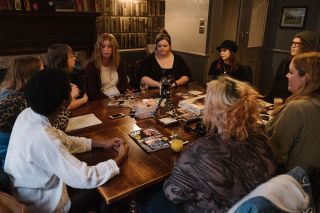
Positive discrimination is a complicated subject
When the subject of positive discrimination came up, our panel was pretty split. While some members voiced frustration at the need to be actively favoured for nothing more than their gender, many of our participants felt that actually, it was just necessary to redress the balance long-term.
Lucy: “No one wants a fucking pity party, that’s what’s really frustrating. I think everyone, by and large, has experienced at some point not being judged fairly because you are a woman. But equally, the other side of that is that you don’t want to get stuff favoured to you because you’re a woman. I don’t need the fucking door opening for me. I think it’s hard as a woman, but my point is I don’t want to be given opportunities because I’m a woman. I want to be given them because I’ve earned them. I’ve been in countless situations, disappointingly, where I know I’ve missed out on something because I’m a woman, or I know someone who’s my equal is getting paid more than me because they’re a man. I 100% believe in the feminist movement, I don’t think it’s anti-men, I believe it’s for women getting what’s equally, rightfully theirs. But I don’t want hand-outs. I think that belittles everything we’re talking about. I just want, if I’ve done the work for something, to be given what I deserve and not less because of the fact I’m a woman. That’s what’s just bizarre to me.”
Becky: “But if you have two bands on equal footing generally speaking, then why not pick the band that is less likely to be picked because people have a bias against them? In some ways, the people that hold the positions where they make choices have a lot of power, whether that’s booking agents or an editor of a magazine. In some ways, the progression that we’re going to see depends very much on the people who hold that power.”
Cassie: “And they’re very usually men, and I think men tend to favour listening to other men – and vice versa as well. I almost think that’s a natural thing – that you do gravitate towards people who look and sound like you. So when you talk about quality control and not giving people a place on a festival or a place in a magazine if they’re not very good… Well, who’s decided that they’re not very good?”
Em: “In terms of minorities, people in these groups aren’t getting the same opportunities as everyone else, and that’s why they are unrepresented in lots of places in the first place. It’s all part of the same societal thing. For a lot of people, if you don’t have those opportunities, then to be given those opportunities with it in mind that you haven’t had those opportunities up until that point is important as well.”
Lucy: “That’s the ticket there, isn’t it? You’re being given opportunities because you haven’t been given them before. It’s not because of who you are, it’s saying actually, you can have this space on this tour because you’ve had to work harder to get it. You’ve had more doors to knock down to get where you are.”
Becky: “That’s why I think that when you talk about women being given a leg up, essentially, and having a door opened for them which maybe wouldn’t have been open for them anyway, I think framing it in that way is a negative thing. Because for every door that’s opened, there’s been 10 that have been slammed in their faces. So until women are getting favourable treatment, and they’re on every single cover of Metal Hammer, I really don’t think it’s an issue.”
Harriet: “Fair is not equal in the obvious sense. It’s actually about taking into account the different needs of the people involved.”
Sarah: “A lot of people take issue with us making a thing out of this, but the thing is that it is a thing. You almost need a bit of positive discrimination to level it out in the long run, because otherwise it’s just not going to get better.”
- TeamRock+ Membership is now £2.99/$3.99!
- Babymetal reveal US and European tour dates
- Black Moth release new video for Sisters Of The Stone
- Svalbard's Serena Cherry slams companies who enforce unpaid internships
Confidence is the greatest obstacle for women in music
From picking up an instrument to believing you have a right to take yourself seriously as a musician, our panel agreed that a lack of self-belief is one of the greatest obstacles facing women in music. With recent figures from the PRS Foundation confirming that their songwriting membership is only 16% female, this seems to be reflected in the music industry at large.
Sarah: “I think that songwriting figure is really shocking. I don’t know if that might be indicative of women in general feeling like they don’t know about PRS, or not thinking that their work as a songwriter is worth compensation, but I don’t think it’s an argument that there aren’t as many female songwriters out there. Half the songwriters I know are female, so I just don’t know why they’re not represented. I do think that PRS are doing their bit to try and change it – I know there’s a couple of things they’ve got going on, like Keychange, which is a fund with the PRS Foundation to provide more women with money to enable them to pursue their songwriting careers. So I think they’re trying to do it, but it’s hard, isn’t it? Because there’s so much noise in this day and age.”
Lucy: “Okay – I doff my cap to men for this, and I think we women should follow suit – but I think that men just have so much more confidence in themselves. From my experience working with bands with guys in – and this is on a lower level – guys have this ingrained confidence that women just don’t. Men will go ‘Right, I’ll push myself to get on that festival bill’. I’ve seen some fucking awful [male] bands at festivals, honestly just terrible. But they’ve got the balls, they’re so driven, they’ll put everything they’ve got into getting there.”
Becky: “I think the confidence thing carries through into other areas as well. When people say, ‘Okay, remove all the men from a bill at a festival, how many women are left?’ Quite often a male argument in response to that is, ‘Well, if there were more good bands with women in, then they would be on the festival’. There is a discrepancy between the number of women who are on a level where they could headline a festival or be higher up on the bill, and that’s something that comes from confidence. You don’t have the confidence to sign up for PRS, maybe you don’t have the confidence to pick up an instrument in the first place, or the confidence to believe that you have a right to be in that place. That’s something that’s a societal issue. It’s not exclusive to rock and metal, but it is prevalent in this scene.
Cassie: “But it’s also much easier for men to play the festivals in the first place, or to do the tours which are going to get them the bookings, because it’s generally easier for men to get there.”
Lucy: “But I think that’s down to that beautiful, dumbfounded single-minded vision of ‘My band is the best band in the world and I’m going to be fucking huge’. I don’t think I’ve ever met a female member of a band with that same sort of attitude, but I’ve met hundreds of male ones. It’s not in our culture as women to big ourselves up like that, it’s just not in there.”
Harriet: “But there’s a part of me that’s almost resistant to that [attitude], and I’m glad I’m not like that. It really jars with me to think that to fit in I have to be one of the guys. How much do we have to change ourselves to be more like men just to exist in this world? That’s what infuriates me.”
Katie: “Across music – and in other areas – there’s a real lack of female leadership when it comes to women actually being able to do their thing and get to the positions of power while still not trying to ‘behave like a man’. You see it time and time again, that women adopt a masculine way of acting. There are statistics and research around the fact that a woman will look at a job application and the first thing that they tend to do is look at the things they can’t do, whereas a man will look at it and go ‘Oh, do you know what, I meet most of them, so I’m going to apply anyway.’ And I think there’s probably something in that, around that confidence.”
Emma: “But maybe everyone just needs a little bit more education in terms of being an artist. Not just women, but artists in general. Where is the idiot’s guide to being a musician, you know? There’s a lot to it, there’s a lot to take on board. In this day and age we all care about making money from what we’re doing, so where’s the education?”
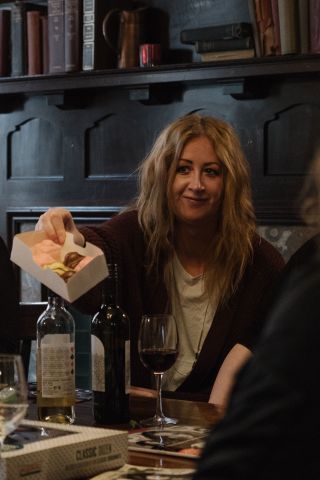
There are still areas of music that suffer extreme inequality
While the conversation around improving equality in music is picking up speed, there are still some areas of the industry where discussions around equality are being left in the shadows. One such area is in music production and engineering. Our panel discussed the discrimination they’ve faced in these worlds, and what we can all do to make it better.
Cassie: “I think I’ve only had the sound done maybe four times by a woman.”
Lucy: “It’s such a rarity still, isn’t it?”
Estella: “I’m a sound person, and I wouldn’t have gone into it if hadn’t known I was learning somewhere I’d feel comfortable. I learnt at [community venue] DIY Space For London, and I got involved because they said it would be inclusive. They had one workshop that was only open to women and non-binary people specifically because it’s still such a male-dominated sphere. They made it seem really open, inviting and like something that anyone could do, whereas before, even though I played gigs, I wouldn’t have considered it because it seemed completely off-limits to me.”
Sarah: “Because you just see men doing it all the time. And there’s the risk that they’d just assume you know a bunch of stuff already.”
Estella: “Yeah, they kind of talk to you as if you should know everything that’s going on, even though you have no experience.”
Lucy: “I don’t know any female crew at all.”
Emma: “I do, but I also know that there’s a lot of sound men that get fucking screamed at by the band. Is that why it’s more male-dominated? Because they don’t want to scream at a woman? Not that they should be screaming at anyone…”
Lucy: “I know that when I was touring, I struggled to get to the next level and subsequently left because you need to be on tour eight months a year to be making a living out of it. I found it really challenging when I got to a certain level, because men don’t want women on tour in case their wives or girlfriends don’t like it. It’s like, why are you just assuming that I’m going to want to fuck everyone? It’s so offensive! But I’ve lost jobs and I had to hang my shoes up and accept I wasn’t going to get where I wanted to get.”
Emma: “I went into work experience and I worked my fucking ass off, I really did. And that’s no disrespect to men, because there are a lot of smart men out there and a lot of smart, brilliant men in the music industry who are great, but girls work fucking hard.”
Becky: “I think the biased opinion generally speaking towards women is that we’re often considered to be an accessory – that we’re not essential to creating this music, therefore we’re not as important. Consequently when something like the ‘Me too’ movement happens, it’s easier people dismiss it because it’s like, ‘Well what were you doing there in the first place?’ as though our right to be present is under attack. Ever since I was a teenager I knew that music was something I had to have in my life and that it was something that I was going to be involved with, and so the dismissiveness of people I’ve encountered has been quite disappointing. I won’t say it set me back, but it’s definitely something I’ve encountered and it’s not been pleasant. That dismissiveness and that attitude towards women is prevalent, whether it’s something you’re involved in as a job or whether you just want to be regarded as a legitimate music fan and be able to go to a show and get someone’s are autograph without people assuming you want to ‘go backstage’.”
Em: “When I was younger, one thing I notice now looking back is that it’s so much more insidious than you think. I remember watching Angela Gossow when she was in Arch Enemy and being like, ‘This is fucking amazing’, and someone replied ‘Yeah, it’s alright… for a girl’. Automatically, the girl bands were shit – Kittie were shit – that was an opinion that everyone had. The other side of it is, I know one of my friends is in a band and they went to get a booking agent, who told them ‘Oh, I don’t do female fronted bands’. And booking agents are the ones who get you get you onto those festivals and bills, that’s where these things start from.”
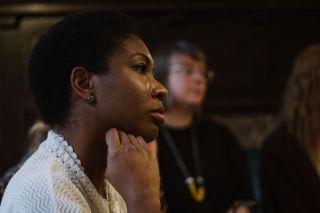
Dudes, you can make a difference
Another thing our panel were largely in agreement about is that we’re all on the right path, positive change is on the way and men in the music scenes can do their bit to help us push for equality. More men being proactive in requesting change will make a difference, and benefit all of us long-term.
Cassie: “I think that largely, men hold the power – it’s men at the top of the magazines, and the festivals, and the record labels. They could help by hiring some women, working alongside women and listening to women.”
Becky: “Listening is an important thing, because no two women are the same. So, listen, and then make decisions for yourselves about how you want to conduct yourselves and how you’re going to support women. Men have to make a conscious decision whether they want to improve things or not, and talk to women about the best way of doing that.”
Sarah: “I think the people in the positions of power have to be proactive about it. They have to admit that this is something that is an issue, and people actually need to care about it and they need to do their bit.”
Becky: “They need to have a social conscience, essentially.”
Sarah: “They don’t need to be a massive outspoken force against it, but they need to play their part in change and be aware of the problems.”
Becky: “Right. If you’re a magazine editor and every issue you’re picking up you’re saying, ‘We don’t have any features about women,’ instead of thinking you should probably do something about that, you should actually do something about that. If you’re a festival booker and you realise you haven’t had any women on the main stage for the last three years, then decide next year you’re going to put one on. It’s about actually making those decisions.”
Lucy: “I think I’d like to see more empathy. You know that thing of, ‘Now I’ve got a daughter I can really relate to that’. It’s so annoying! Fuck off, you shouldn’t need to have a sister, or a daughter, or anything – just be aware. I’d like to see a level of empathy, because we are fighting for equality. Saying sexism very much exists doesn’t mean that we’re fighting against men, and it doesn’t mean at all that it’s us against them. It’s all of us against the patriarchy.”
Becky: “It’s like that attitude that you can turn your back on it because it doesn’t involve you. The people who are the most privileged, society-wide, are straight white men. They are the people who have the most power, and the control to do something about it, and they choose not to. And if they choose not to, unfortunately they are part of the problem.”
Lucy: “See, that’s what it comes down to. Sure, it’s not your fight, you’ve got nothing to do with it, but how about you pick a side and come and join the battle, mate. Because we need all the people we can get.”
Photographs by Brad Merrett.
This article is part of the #SheRocks online campaign. Check out more #SheRocks content on Twitter, Facebook, and over on the TeamRock site.
Classic Rock, Metal Hammer, Prog & TeamRock launch She Rocks month
Meet the people making festivals a better place for women
The events and workshops where women can kickstart their metal career
- The loudest Bluetooth speakers: crank your tunes one louder
